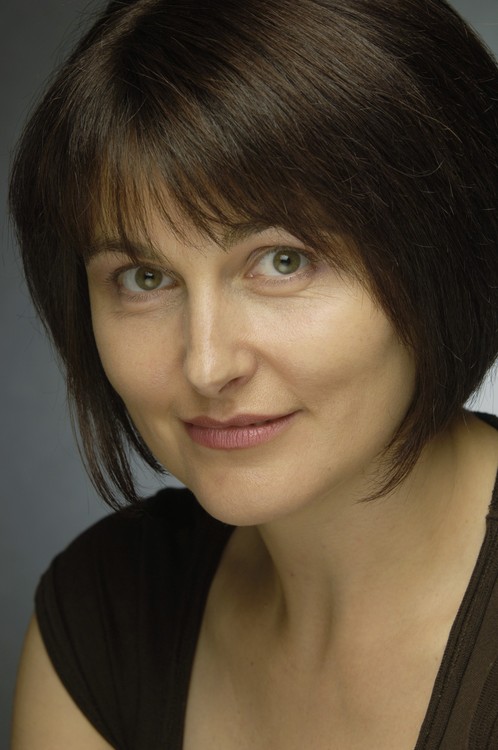Today I’m thrilled to present an interview with Karen Campbell. She is the author of five novels: The Twilight Time, After the Fire, Shadowplay and Proof of Life – all Hodder & Stoughton. Karen’s new novel This Is Where I Am and is out now, published by Bloomsbury Circus. A graduate of Glasgow University’s Creative Writing Masters, Karen also teaches creative writing and carries out freelance communications training.
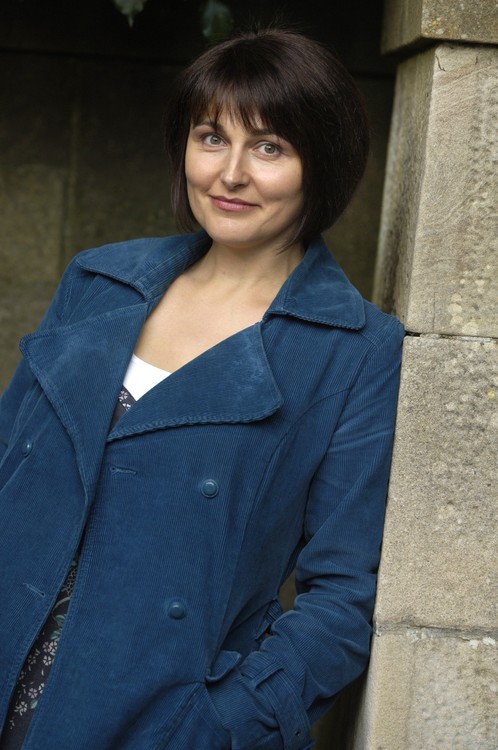
Photo: Ian Watson, Studio Scotland
I recently read her latest novel ‘This Is Where I Am’ and was hugely impressed. The story of the relationship between a Somalian refugee and a Glaswegian volunteer was incredibly moving and life-affirming. Karen’s first four novels are within the crime/police-procedural genre, whilst her fifth novel is somewhat of a departure from this; as Karen explains below, all 5 of her novels have a lot more in common than one might think at first glance.
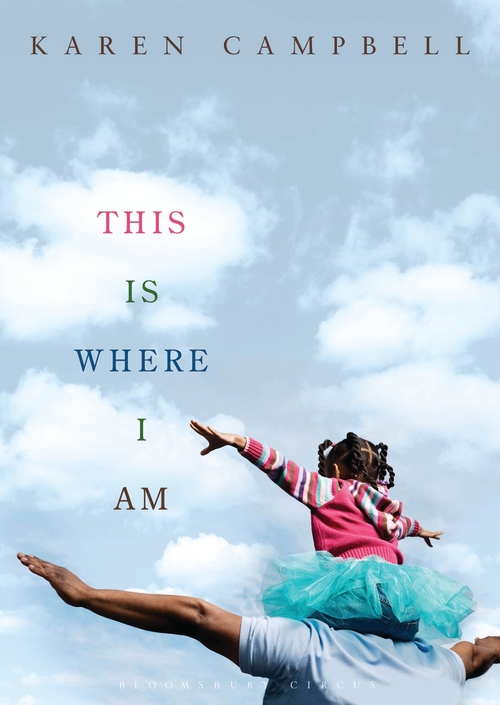
Here Karen shares her thoughts on writing, on Glasgow and the Scottish vote, amongst other things:
[1] I understand you attended the Glasgow University creative writing course. How do you feel this helped you as a writer? And how do you feel about creative writing classes in general?
One of the main benefits for me in doing the Masters was that sense of being part of a community of writers and fellow readers, where you could both share work and be inspired.
When you start writing, it tends to be a solitary, hidden thing – almost like a guilty secret you don’t want to mention! And there’s a sense, or a worry maybe, that you’re ‘getting above yourself’ or being arrogant or self-delusional in some way – when all you’re really trying to do is tell stories, and work out what you and your characters think about life, beliefs, emotions, whatever. Suddenly being with all these other folk who also think the same thoughts as you, who you can talk to and share your work with and not be embarrassed or shy was like someone had turned a light on for me. It wasn’t a prescriptive course – nobody said ‘this is how you write a novel’; it was more about listening to established writers talk about what works for them, being set a few challenges, having your ideas stirred up – and then being left to get on with it – with a bit of nudging and gentle guidance. But I never felt I was being asked to ‘be’ a certain type of writer; only given the space and encouragement to be the best possible writer I could be.
[2] In a previous life, you were a police officer! Your first novels were based around this theme. Your latest novel ‘This is Where I Am’ seems a departure from this. What brought about this change in your choice of subject matter? How was writing this novel a different experience from writing your previous ones?To me, there’s honestly very little difference with this book and my others. They’re all about social issues, all set in Glasgow. I’ve always said that, with my first four books, I was writing about people who just happened to be cops, but the thrust was always about identity – the public and the private faces we present to the world: lives behind closed doors, behind facades, behind the uniform – and This Is Where I Am is a variation on that theme. Those faces you pass in the street everyday – who are they? Where are they from? What do they go home to at night? I find all of that fascinating.
Having been a police officer before my kids came along, that was the impetus to start writing the first book – to try and describe what it’s really like to walk down the street in uniform – the same 20 year old girl you were the week before, but with a new ‘status’ imposed on you by the clothes you’re wearing, the expectations and restrictions that places on you, the presumptions folk make about you and so on. With each police book I wrote though, I was pushing myself further and further away from what I knew. For example in the second novel, After the Fire, I write about what happens when a police firearms incident goes wrong. I’ve never been a firearms cop, never even held a gun. So all of that required a lot of research, and every book thereafter was much less about my own experience and more about exploring other lives, about the disparity of what wee ‘bits’ folk see of you and the ‘whole’ you (if there is such a thing!) . So This Is Where I Am feels like a natural extension of this, definitely.
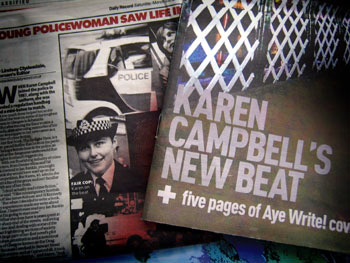
Glasgow has the biggest amount of refugees and asylum seekers in Scotland – but it wasn’t until my husband started volunteering for the Scottish Refugee Council (SRC), that this ‘issue’ became more personal, about real people like you and me. I couldn’t count how many times I said: ‘You’re joking?’ when Dougie would talk about stuff he’d seen that day: Folk destitute after having their claim for help refused. Asylum seekers left in limbo for six or seven years. Families with children, settled at school after years of living here, being abruptly ‘returned’ to a place their kids no longer knew. And I kept thinking: what if it was me? That was the key for writing ‘This Is Where I Am’.
I started to imagine what it must be like to lose your home, your job, your family and end up in a place you never even knew existed. Like driftwood. The most immediate way in for me was to think of language. When you go abroad, and you can’t speak the language. You can’t articulate what it is you feel. You feel stupid, vulnerable. Scared. And that’s before you have to start thinking about arguing your case for sanctuary, about battling the system, about remembering what you’ve lost.
I spoke to several refugees and asylum seekers, to try to get the facts right, about refugee camps, about the asylum process , but also to try to build up a picture that went beyond what I might imagine it must feel like to be a refugee. Having my husband working as a volunteer helped hugely with understanding how the SRC charity operates, and what Deb’s role as a volunteer might be within that. I also did lots of online research, watching documentaries about Dadaab Refugee Camp, reading UN reports etc. But when it came to writing the characters, I had to boil all the facts down to feelings. Abdi is a dad who’s lost his wife. He’s lonely and sad. He’s fled to a foreign country – which is disorientating, and makes him scared and brave in many different ways. He’s trying to get to grips with what he ‘is’ now, who he can trust and what kind of life he can make for himself and his daughter. Debs is also suffering a loss, and learning how to live in a way she hadn’t planned, so she’s just as confused and vulnerable as Abdi. These are universal emotions –we’ve all felt them. Of course, Abdi’s traumas are far bigger than any I’ve suffered, so I spoke to a doctor and an educational psychologist about the impact these experiences could have. But one of the things that struck me most about the refugees I spoke to was their resilience and their hope, so I tried very much to show that too. This is definitely a hopeful book .
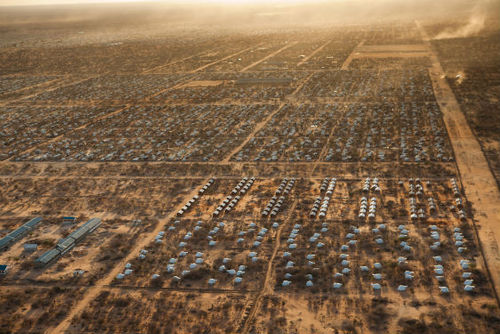
Dadaab Refugee Camp
[3] How important is Glasgow to you as a writer? What part does it play in your oeuvre as a whole? I read one review of ‘This is Where I Am’ that said it is a celebration of Glasgow – how do you feel about that view?That’s a great thing to say! It definitely felt like a bit of a love letter to the city – after writing about some of the darker bits of Glasgow in my police books, I was keen to show off some of the many, many lovely and/or quirky places Glasgow has to offer. Plus, writing from a refugee’s point of view, it forces you to look at the world anew – places that you take for granted can look very different through an outsider’s eyes. For example, Kelvingrove Art Gallery is a splendid, Baroque museum – and it’s free to enter. But, if you didn’t know that, and you saw the man in uniform at the vast, arching front doors, you might not even venture up the steps to look inside. You might actually see it as intimidating instead of welcoming. Which could be a metaphor for Glasgow…!
Even in the police novels, I always tried to show the light and shade of the city. It is a wonderful place, with beautiful parks and buildings, a really sharp, distinctive identity and a gallus humour that can’t help but seep into the dialogue of the characters I write. But my next two books won’t be set in Glasgow – I think you need to keep stretching yourself away from the familiar if you want to keep ideas sparking. Certainly, I feel I need to do that at the moment. Also, we moved away from Glasgow a few years ago, and now live in rural Galloway – so maybe that has something to do with the change in setting too.
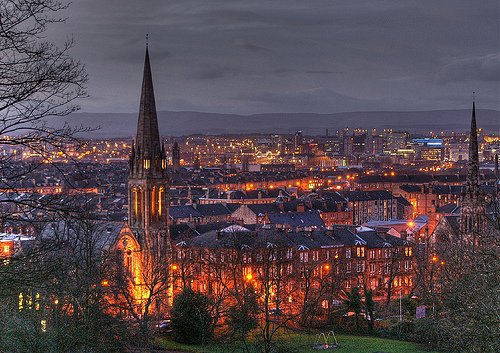
It was amazing. It was the first time I’d had anything adapted, and I’d no involvement in the process at all, so the very first time I heard it was when the initial episode was broadcast. When Abdi spoke, I must admit, I had a wee sniffle – the actor playing him got the voice SO right – Abdi was a multi-faceted man, with a temper and a sense of humour – not a ‘victim’ at all. And Maureen Beattie, who played Deb was also spot on. I’d met Jane Marshall, the producer, in advance and she was so lovely about the book, I knew it would be in safe hands. Obviously, a lot of the ‘side’ stories had to be shaved off for reasons of time, but the essence of the book was all there. Plus radio had some real advantages – there’s a part in the book where Abdi’s daughter hums a Somali lullaby, and Jane managed to track down a recording of this and have it playing in the background of some of the scenes. Which set me off snivelling again..!
[5] Would you like to share your view about the Scotland vote?Happy to share! Since the turn of the year, I’ve been speaking at various events across the county on behalf of Yes – as have a huge amount of creatives. This has been such an exhilarating, dynamic process for Scotland, and it’s been a real privilege to be involved. Not many folk get the chance to truly consider: What kind of a country do I want to live in? What do I think about democracy and where it should lie? The Yes movement is such an inclusive, positive campaign – living near the border, I’ve shared a platform with many English Scots who also see the benefits of what our Holyrood Parliament has already done for us, and how, with control of all our resources, we can build a better Scotland. It’s about taking responsibility for our own actions, our people, our policies – all that any nation wants really. Everything’s on a knife edge at the moment, but whatever way the vote goes, folk are so engaged – they’re suggesting a possible 90% turn out, which is amazing for democracy and politics as a whole.
[6] Can you share what you’re working on next? Are you attending any events coming up you’d like to publicise?Sure. I’ve got a new book that will be coming out with Bloomsbury next spring. It’s called Rise and surprise surprise (see above answer!), it’s set in Scotland in the run-up to the referendum. Essentially it’s about a marriage in crisis and a cuckoo in the nest of that marriage, who brings her own problems to bear, but it’s also about how you feel safe, and where you call home when you carry your shadow with you. And I’m just back from Italy, where I’ve been doing a bit of research (involving much wine and pasta…) for the book I’m starting now, about the US Buffalo soldiers in Tuscany in WW2. I’ve never attempted a historical book before, so am way out of my comfort zone! But the story’s been nudging at me for 3 years now and I can start to feel the characters forming in my head – in fact, I wrote the first 500 words today. Only 89,500 to go!
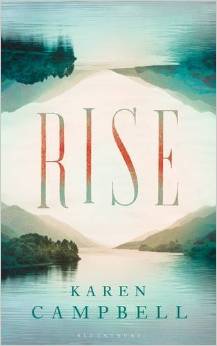
Thanks so much to Karen for such fascinating responses. Please look out for her books in your next bookshop browse and I’d particularly recommend ‘This Is Where I Am’ as an excellent read.
To find out more about Karen and her work, check out her website here:
http://www.karencampbell.co.uk/
and her Wikipedia page:
http://en.wikipedia.org/wiki/Karen_Campbell
